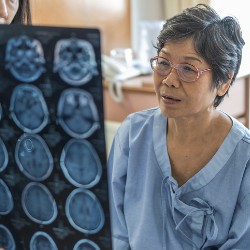2015 CTSI Incubator: The Gut Microbiome Affects Musculoskeletal Health
Results from the 2015 CTSI Incubator project suggest there is a connection between gut microbes in obesity and impaired musculoskeletal health. Members of the Incubator project team presented results at the Orthopaedic Research Society (ORS) Annual Meeting this week that suggest manipulating the gut microbiome in obese animals can slow osteoarthritis and speed healing after fracture.
Obesity and type 2 diabetes have been known to delay fracture healing and accelerate erosion of joint cartilage in osteoarthritis. The 2015 Incubator project, led by Michael Zuscik, Ph.D., associate professor of Orthopaedics; Robert Mooney, Ph.D., professor of Pathology; and Cheryl Ackert-Bicknell, Ph.D., associate professor of Orthopaedics, aimed to understand how and why this occurred.
The group found that all of these negative effects of obesity were linked to changes in the gut microbiome. Feeding mice a high fat diet to mimic obesity and type 2 diabetes altered the types of bacteria in their colon, favoring pro-inflammatory bugs. This coincided with greater systemic inflammation, which may have contributed to accelerated osteoarthritis and delayed fracture healing.
Not only did the team find a link between the obese gut microbiome and impaired musculoskeletal health, but they think they can reverse it. In preliminary studies, obese mice were fed a fiber supplement that they cannot digest, but that certain helpful gut microbes love. Despite continuing to feed the mice a high fat diet, the non-digestible fiber shifted their microbiome back toward the non-inflammatory bacterial profile seen in lean mice.
That microbiome shift in the obese mice also reduced systemic inflammation, slowed osteoarthritis progression, and restored fracture healing. Essentially, the non-digestible fiber completely reversed the negative effects of obesity on the musculoskeletal system, making the obese mice indistinguishable from their lean counterparts in terms of musculoskeletal health.
Members of the Incubator project team presented these and other related results this week at the ORS Annual Meeting in San Diego, CA. Christopher Farnsworth and Eric Schott, both graduate students in Pathology, gave podium talks and Ashlee MacDonald, Orthopaedics resident, presented a talk as part of a special Late-Breaking session.
Schott also earned a young investigator travel award to present his research about the effect of the obese microbiome on osteoarthritis at next month’s Osteoarthritis Research Society International Meeting, where he will be featured in a special session and an award ceremony.
Michael Hazard | 3/22/2017



